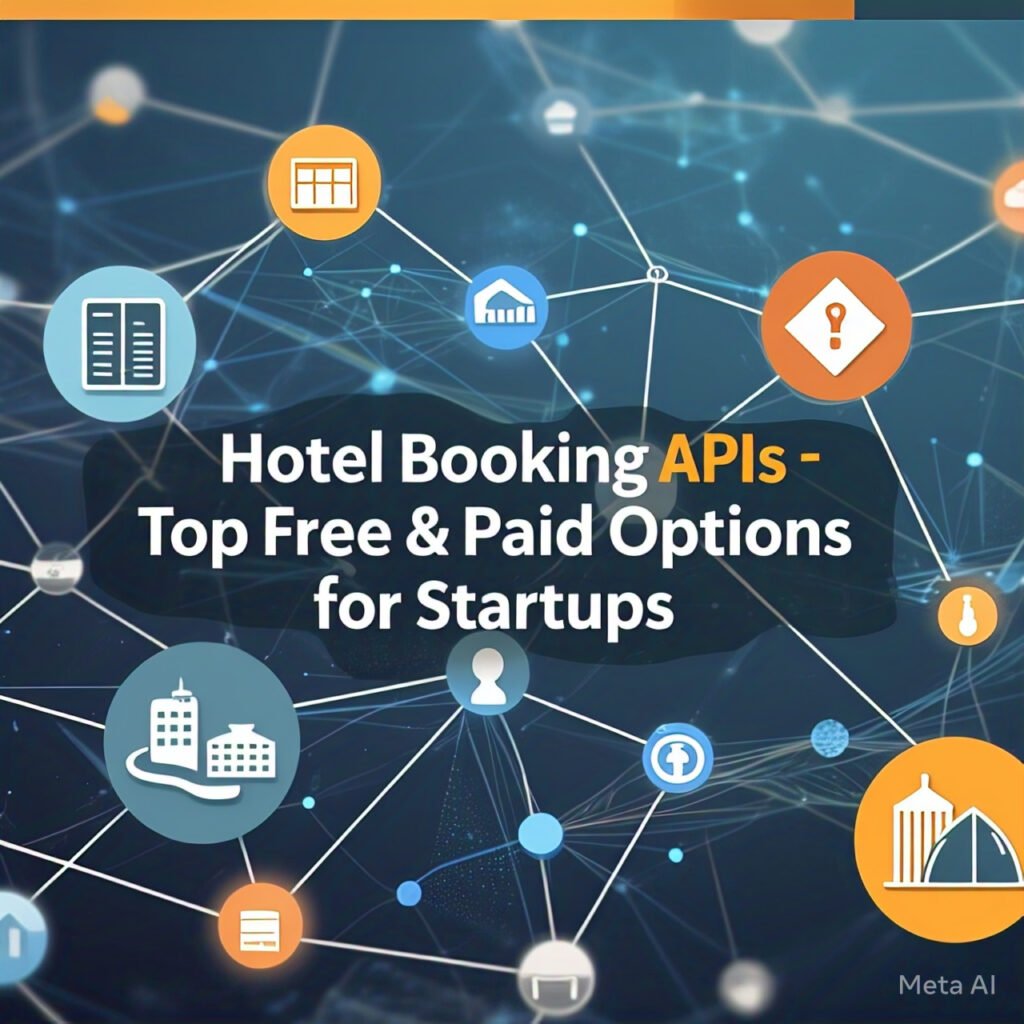In today’s fast-paced digital landscape, hotel booking APIs have become a game-changer for startups venturing into the travel tech space. Whether you’re developing a niche hotel booking app or integrating a booking feature into an existing platform, the right API can significantly enhance your product’s functionality and user experience. With a mix of free hotel booking API options and robust paid hotel booking API solutions, startups can balance cost with performance while ensuring scalability and reliability.
This comprehensive guide explores the top free and paid hotel booking APIs available for startups. We’ll break down the features, benefits, and integration tips for each solution, backed by insights from industry leaders and authoritative sources like Wikipedia and Skyscanner. Additionally, we’ll integrate relevant topics from amglobal.org to help you understand how these APIs fit within broader travel technology trends. Whether you’re a tech founder, developer, or product manager, this article offers valuable insights to help you make an informed decision.

What Are Hotel Booking APIs?
Hotel booking APIs are interfaces that allow different software applications to communicate with hotel booking systems, enabling functionalities like real-time availability checks, reservations, and payment processing. They serve as the backbone for many travel and hospitality applications, allowing startups to leverage existing data and infrastructure without building everything from scratch.
Key Features of Hotel Booking APIs:
- Real-Time Data Access: Retrieve up-to-date information on hotel availability, pricing, and amenities.
- Seamless Integration: Easily integrate with your website or mobile app.
- Payment Processing: Secure transactions and booking confirmations.
- Scalability: Support growing user bases with minimal downtime.
- Customization: Tailor the API to meet specific business needs.
For further details on how APIs function, refer to the Wikipedia API article.
The Importance of Hotel Booking APIs for Startups
Startups in the travel tech sector often operate on lean budgets and tight deadlines. Hotel booking APIs offer several advantages:
- Cost Efficiency: Many startups prefer free hotel booking API options to minimize initial development costs.
- Faster Time-to-Market: By leveraging pre-built functionalities, startups can accelerate product development.
- Enhanced User Experience: Seamless and reliable booking experiences improve customer satisfaction and retention.
- Scalability: As your startup grows, paid API options provide advanced features and dedicated support to handle increased traffic.
- Competitive Edge: Innovative API integrations can differentiate your service in a crowded market.
Integrating these APIs can also lead to potential revenue streams through affiliate partnerships and cross-promotional opportunities, as demonstrated by platforms like Booking.com and Expedia.
Top Free Hotel Booking APIs for Startups
Many startups start with free APIs to test their concepts before scaling. Here are some notable free options:
1. Amadeus for Developers – Self-Service APIs
- Overview: Amadeus offers a robust suite of APIs for travel data, including hotel booking capabilities.
- Features: Real-time availability, pricing data, and reservation management.
- Documentation: Comprehensive and developer-friendly documentation.
- Link: Explore more on the Amadeus for Developers platform.
2. RapidAPI Marketplace
- Overview: RapidAPI aggregates multiple hotel booking APIs, including free tiers.
- Features: A variety of endpoints for hotel searches, reviews, and bookings.
- Benefits: Easy integration with multiple APIs under one platform.
- Link: Check out the RapidAPI marketplace for detailed listings.
3. Hotelbeds API (Free Trial)
- Overview: While primarily a paid solution, Hotelbeds offers a free trial period.
- Features: Access to a vast inventory of hotels, real-time availability, and booking management.
- Use Case: Ideal for startups wanting to test high-quality data before a long-term commitment.
- Link: Learn more about Hotelbeds.
Advantages of Free APIs:
- Zero or Low Cost: Reduce initial expenses.
- Testing and Prototyping: Perfect for early-stage product validation.
- Community Support: Access to developer forums and online communities for troubleshooting.
Top Paid Hotel Booking APIs for Startups
For startups ready to scale, paid APIs offer enhanced functionalities, reliability, and dedicated support. Here are some leading options:
1. Booking.com Affiliate Partner Program API
- Overview: Provides extensive hotel data and booking capabilities from one of the world’s leading travel platforms.
- Features: Real-time pricing, user reviews, and multi-language support.
- Support: Comprehensive technical support and regular updates.
- Link: Join the Booking.com Affiliate Partner Program for more details.
2. Expedia Partner Solutions (EPS) API
- Overview: Offers a full suite of travel APIs, including hotel booking services.
- Features: High-quality inventory, dynamic pricing, and robust security.
- Benefits: Trusted by major travel brands with a global footprint.
- Link: Discover more about Expedia Partner Solutions.
3. HotelsCombined API
- Overview: Aggregates data from numerous sources to provide competitive hotel pricing.
- Features: Comprehensive search filters, seamless integration, and advanced analytics.
- User Experience: Known for its user-friendly interface and detailed reporting.
- Link: Visit HotelsCombined to explore their API.
4. Sabre Hospitality Solutions
- Overview: Offers enterprise-level APIs for hotel booking and management.
- Features: Extensive global hotel inventory, advanced analytics, and customer support.
- Scalability: Ideal for startups planning rapid expansion.
- Link: Find out more about Sabre Hospitality.
Benefits of Paid APIs:
- Enhanced Reliability: Guaranteed uptime and faster response times.
- Comprehensive Features: Access to premium features like dynamic pricing and advanced analytics.
- Dedicated Support: Professional assistance to ensure seamless integration and operation.
- Scalability: Better suited for growing businesses needing consistent performance.
Comparison Table: Free vs. Paid Hotel Booking APIs
| Feature | Free Hotel Booking APIs | Paid Hotel Booking APIs |
|---|---|---|
| Cost | No initial cost or limited free trial | Subscription or pay-per-use models |
| Data Quality | Basic data, may have limited coverage | High-quality, extensive inventory and features |
| Integration Support | Community-driven, basic documentation | Dedicated support and comprehensive documentation |
| Scalability | Suitable for early testing and prototyping | Designed for high traffic and rapid scaling |
| Customization | Limited customization options | Advanced customization and integration options |
| Reliability | May experience downtime during peak loads | Guaranteed uptime with SLAs |
How to Integrate Hotel Booking APIs in Your Startup
Integrating a hotel booking API can be a smooth process if approached strategically. Here are the steps to ensure a successful integration:
Step 1: Define Your Requirements
- Business Needs: Identify the functionalities you need, such as real-time availability, booking management, or payment processing.
- Budget Considerations: Decide if a free API suffices or if you need the robust features of a paid solution.
- Technical Stack: Ensure the API aligns with your existing technology stack.
Step 2: Evaluate API Providers
- Documentation: Assess the quality and clarity of the API documentation.
- Support: Look for providers with strong customer support and active developer communities.
- Scalability: Consider your long-term growth plans and choose an API that scales with your business.
Step 3: Test the API
- Sandbox Environment: Use sandbox testing environments provided by many API providers to experiment without affecting live data.
- Integration Trials: Run tests to ensure the API integrates seamlessly with your system.
- Feedback Loop: Collect feedback from beta users and developers to fine-tune the integration.
Step 4: Deploy and Monitor
- Deployment: Once testing is complete, deploy the API to your production environment.
- Monitoring: Continuously monitor API performance and user feedback to address any issues promptly.
- Updates: Stay updated with any API changes or updates to ensure continued compatibility.
For additional guidance on API integration best practices, check out this in-depth article on API Integration Strategies.
Real-World Use Cases and Success Stories
Many startups have successfully leveraged hotel booking APIs to revolutionize the travel booking experience. Here are a few examples:
- Startups in Niche Markets: Several niche travel startups have integrated free and paid hotel booking APIs to offer curated hotel selections for luxury travelers, backpackers, or business professionals. These integrations have enabled them to provide personalized recommendations, leading to higher customer satisfaction and repeat bookings.
- Global Travel Aggregators: Large platforms use robust hotel booking APIs from providers like Expedia and Booking.com to offer extensive hotel inventories and competitive pricing. Their success stories illustrate the critical role of advanced API features in enhancing user experience and operational efficiency.
- Innovative Mobile Apps: Mobile applications that integrate hotel booking APIs have streamlined the booking process by offering features such as geolocation-based searches, dynamic pricing updates, and real-time availability—all of which have contributed to improved customer engagement.
For more insights on travel tech innovations, visit amglobal.org’s travel tech section.
Challenges and Considerations for Startups
While hotel booking APIs offer tremendous benefits, startups should be aware of potential challenges:
Data Consistency and Quality
- Issue: Free APIs might not always provide the most accurate or comprehensive data.
- Solution: Cross-reference multiple APIs or consider transitioning to a paid solution for critical applications.
Integration Complexity
- Issue: Integrating with multiple APIs can complicate your system architecture.
- Solution: Use middleware or API management platforms to streamline integration and maintenance.
Security and Compliance
- Issue: Handling sensitive customer data demands robust security protocols.
- Solution: Choose API providers that comply with international data protection regulations such as GDPR and PCI-DSS.
Cost vs. Value
- Issue: Balancing cost and functionality can be challenging for early-stage startups.
- Solution: Start with a free or trial version, and upgrade to a paid solution as your user base grows and revenue increases.
Reliable Web Hosting
In addition to integrating the best hotel booking APIs into your startup, consider leveraging affiliate partnerships to generate additional revenue streams. For instance, if you need reliable web hosting to support your application, you can rely on Hostinger for affordable, high-performance hosting solutions. Hostinger is a popular choice among startups due to its robust infrastructure and competitive pricing, ensuring your online presence remains fast and secure.
Moreover, integrating affiliate partnerships within your travel platform can further enhance user experience. Many travel sites collaborate with service providers to offer comprehensive solutions that include hotel bookings, flight reservations, and car rentals—all under one roof. By incorporating affiliate links smartly, you can provide added value to your users while generating a passive income stream.
Frequently Asked Questions (FAQ)
Q1: What is a hotel booking API?
A: A hotel booking API is an interface that allows software applications to interact with hotel reservation systems, enabling functionalities such as real-time availability, bookings, and payment processing. For more details, refer to Wikipedia.
Q2: What are the differences between free and paid hotel booking APIs?
A: Free hotel booking APIs typically offer basic features and are ideal for prototyping and testing, while paid hotel booking APIs provide advanced functionalities, better data quality, enhanced support, and scalability for high-traffic applications.
Q3: How can hotel booking APIs benefit startups?
A: They enable startups to quickly launch travel booking platforms, reduce development costs, enhance user experience, and provide scalability. They also allow businesses to access a wide range of hotel data without significant upfront investment.
Q4: What should I consider when choosing a hotel booking API?
A: Key factors include data quality, integration support, scalability, cost, security compliance, and ease of use. Evaluating provider documentation and support services is also essential.
Q5: Are there any recommended resources for API integration?
A: Yes, resources such as IBM’s API integration guide and developer communities on platforms like RapidAPI provide excellent insights and support for API integration.
Related Topics
- Travel Tech Trends: The Future of Hospitality
- API Integration Best Practices for Startups
- Digital Transformation in Hospitality
Conclusion
Hotel Booking APIs are revolutionizing the travel tech industry, providing startups with the tools they need to build innovative, user-friendly platforms. Whether you choose a free hotel booking API for initial testing or opt for a comprehensive paid hotel booking API for scaling your business, understanding your requirements and choosing the right partner is crucial. With the right integration strategy, you can offer seamless booking experiences, drive customer satisfaction, and build a competitive edge in the dynamic travel market.
Start by evaluating your needs, testing available options, and keeping scalability in mind. Leverage affiliate partnerships—like promoting Hostinger for hosting—to support your backend infrastructure and further monetize your platform. As you navigate the challenges and opportunities in the travel tech space, these insights and resources will empower you to create a sustainable and innovative travel booking solution.
Disclaimer & Affiliate Disclosure
Disclaimer: This article is intended for informational purposes only. The views expressed herein are based on current research and industry trends. Always conduct your own due diligence before integrating any API or affiliate service.
Affiliate Disclosure: Some links in this article, such as Hostinger, are affiliate links. If you make a purchase through these links, we may earn a small commission at no additional cost to you.






